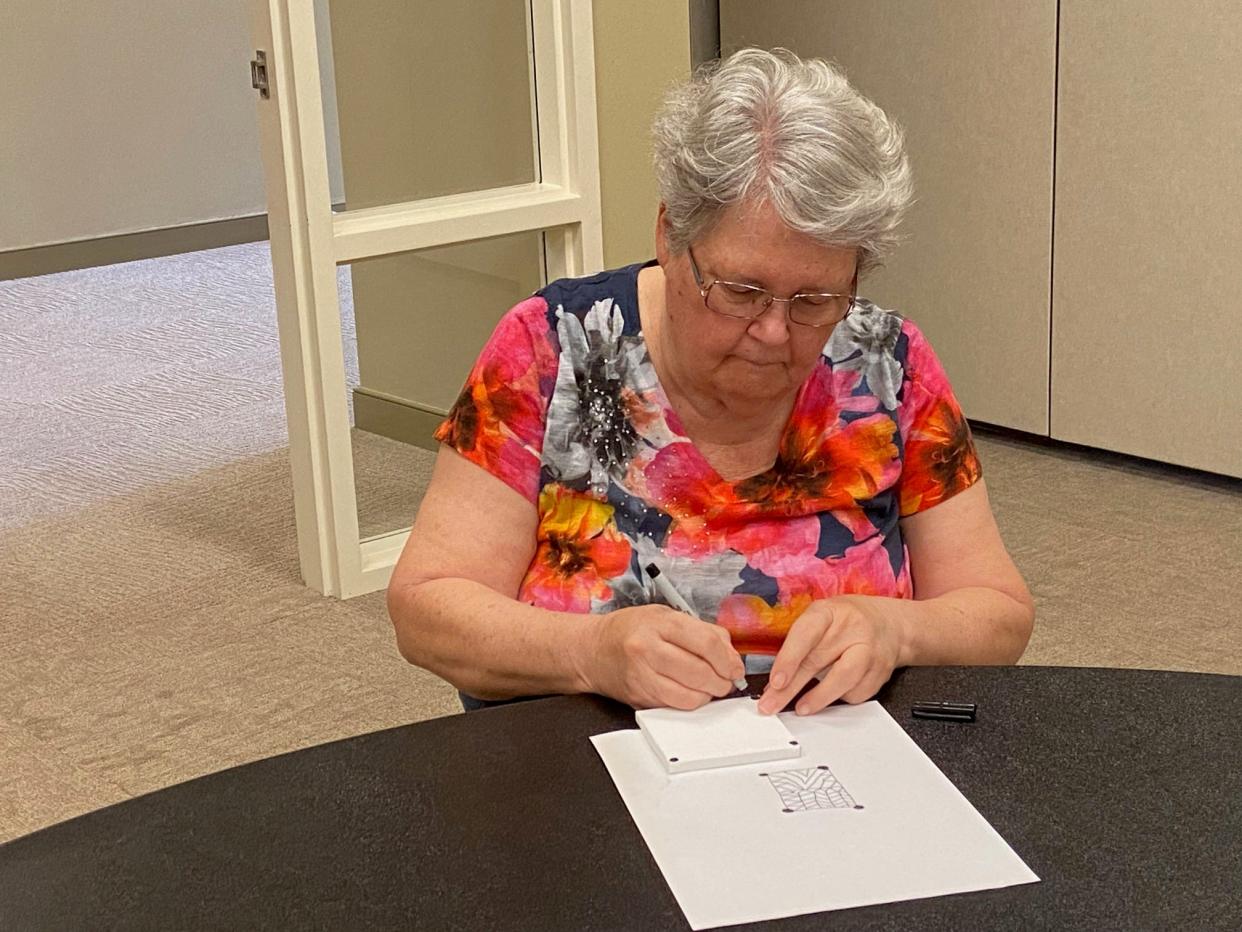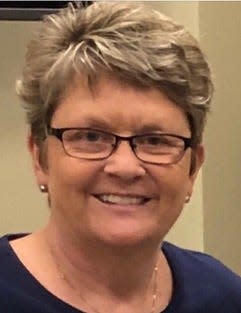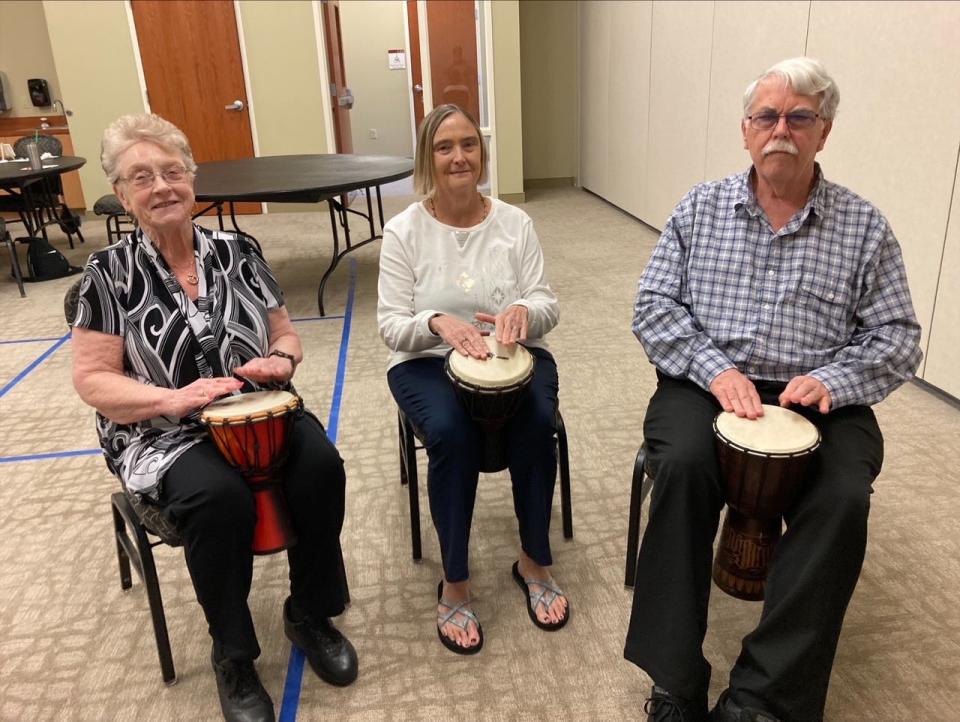A safe place: Memory Cafe offers activities for people with dementia and their families

A safe place to go and socialize with like-minded people.
A relaxed, yet structured, setting with a program encompassing a little art and music, conversation, reading, light exercise and faith.
That’s what Vicky Pitner and volunteers who assist her provide Monday mornings at First United Methodist Church of Lakeland’s Memory Cafe.
It’s not a cafe in the traditional sense, although coffee, tea and often refreshments are available.
For people whose cognitive issues increasingly create barriers, it’s an alternative place to go with a family member, partner or friend without fear of judgment or embarrassment.
The Memory Cafe is designed for “supporting individuals living with memory challenges,” said Pitner, a certified dementia practitioner and therapeutic recreation specialist.
Is a statin drug in your future? They can lower your risk of heart disease, but are no substitute for healthy living
Just normal aging? Maybe not. Forgetfulness could be a sign of mild cognitive impairment
Got lower back pain? The treatment options are almost as varied as the causes
Memory cafes were introduced in the late 1990s in the Netherlands as a way of breaking through stigma sometimes associated with various forms of dementia and to better include families.
“We help these families learn how to engage and communicate,” Pitner said.
“It’s hands-on training for families to learn how to get more out of that person (who has memory issues). They often realize the person can do more than they realized.”
Memory cafes have formed around the United States and in other countries. People can locate cafes near them and learn more on www.memorycafedirectory.com.
At First United Methodist, the program is part of the church’s congregational care ministry. It’s open to people who attend other churches, as are some of its other memory-related services.
“This is how we show love to our congregation and community,” said the Rev. Andy Whitaker Smith, associate pastor.
“We don’t want people to feel they’re alone in these situations.”
A growing number of families have members who have severe memory issues, he said, and they need to know “It’s OK to talk about it.”

Families Share Their Experience
“It gives us something to do that’s fun,” said Megan McDonald, who has been attending with her mother, Carol McDonald.
“A lot of people feel they can’t take their loved ones anywhere” if their behavior changes, she said, adding that some people became uncomfortable if her mother, who taught elementary school for years, kept looking at their children.
“She doesn’t mean anything by it,” Megan McDonald said.
Her mother, participating intently in activities at the cafe one Monday in mid-March, mentioned frequently how much she loved teaching young children, even though they frequently had to be told to hush.
Kathy Leahy, who comes with her husband, Dave, said the cafe is an opportunity for them to socialize.
It also gives her good ideas on games they still may be able to play now that his rummy playing skills have deteriorated.
Dave Leahy was a criminal research specialist for Homeland Security when he became aware he was having memory problems. He was diagnosed with dementia about five years ago, his wife said.
Both he and Carol McDonald were about the same age, in their mid-60s, when each was diagnosed.
The Leahys learned of the Memory Cafe from a home-health social worker. They enjoy it and said the time frame, 10 to 11:30 a.m. on Mondays, works well for them.
“We are fortunate to also have good neighbors and a good church,” Kathy Leahy said, mentioning friends from St. Stephens Episcopal with whom they go to lunch regularly. Dave had been an usher there.
“It lets you know you’re not alone dealing with this,” said Megan McDonald, who attends First United Methodist.
“You meet other families going through similar things.”
She and her mother, who recently entered a local assisted care facility, lived together for several years after the diagnosis.
Families also connect at caregiver support groups, of which the Alzheimer’s Association offers many. Several are in Polk County.
Those typically don’t have the person with memory issues in the same group as families or friends providing care, although some do, particularly with early Alzheimer’s.

Cafe a Different Approach
Pitner avoids using the term caregiver. Instead, she would identify Megan as her mother’s daughter and Kathy as her husband’s wife.
The elements this memory cafe offers — social, physical exercise, cognitive exercise, expressive arts and spiritual — weren’t chosen at random. All are components of therapeutic recreation, Pitner said.
Drumming, one of the activities Dave Leahy enjoys there, is “a very good means of self expression,” Pitner said. It also provides group interaction and non-verbal communication.
Other memory cafes may put more focus on one or two approaches.
In her part-time employment with First United Methodist, Pitner also leads a weekly online family support group. It’s open to people outside the church, as are family trainings on Zoom or in live presentations.
Contact Pitner about those activities by emailing vpitner@firstumc.org .
The church received a grant that can let it cover several hours of home care a week at no cost to families participating in the memory cafe.
Smith encourages other churches to find ways of helping people and families in this situation, which includes both joy and challenges.
“At the very least, any church can listen,” he said.
Statistics and Contacts on Dementia
827,000-plus people in Florida alone provide more than $23.4 billion in unpaid care for people living with dementia.
Nationwide, an estimated 6.7 million Americans age 65 and older are living with Alzheimer’s dementia (the most common type of dementia).
The Alzheimer’s Association has a 24-hour helpline, 800-272-3900, that people can call for information, including locations of support groups. Its website is www.alz.org .
Source: Alzheimer's Association
Robin Williams Adams can be reached at robinwadams99@yahoo.com.
This article originally appeared on The Ledger: Lakeland Memory Cafe is a safe place for people with dementia

